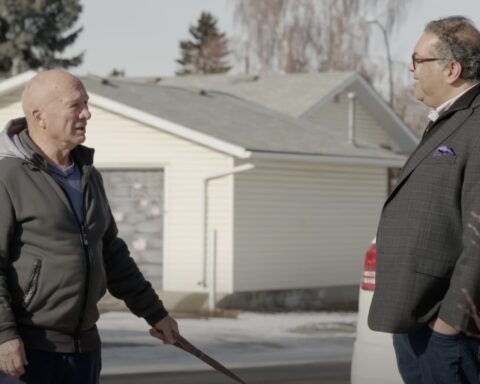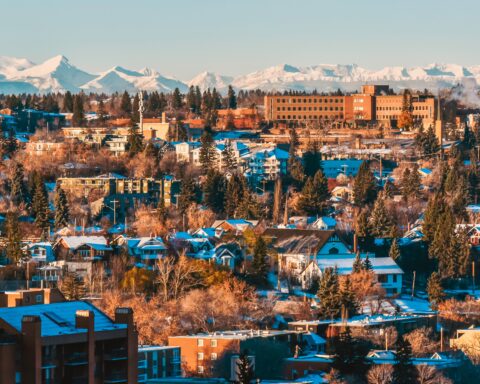In concluding this series, I’d like to offer some context to what happened on May 5 in the Alberta provincial election and some insights on what, if anything, it might mean for federal party prospects in Alberta during this fall’s parliamentary elections.
That the Alberta political culture has much in common with the larger Canadian political culture often surprises many Canadians. The fact that the Alberta political culture is increasingly progressive and libertarian often comes as a surprise to even many within the province.
For the past several decades, my colleagues and I at the Citizen Society Research Lab (CSRL) at Lethbridge College have been measuring public opinion in southern Alberta, and for the past six years, in the entire province. Reports and full tabular data are available on our CSRL web pages.
Political Opinion in Alberta
Over time, we’ve discovered a thoroughly liberal-pluralist political culture – increasingly libertarian on a number of key indicators – that defies the stereotypes most Canadians have of Albertans, and indeed many Albertans have of themselves.
Each semester we ask six questions measuring opinion on abortion choice, same-sex marriage, capital punishment, medical and recreational marijuana, and doctor-assisted suicide. We’ve summed up the responses to create a general scale of political culture values that provides not only an annual snapshot, but also allows us to track change over time.
A brief summary of the results shows:
- Albertans are staunchly pro-choice on abortion (80.9 per cent support)
- Strongly in favour of legal access to doctor-assisted suicide (77.7 per cent)
- Strongly in favour of legal access to medical marijuana (79.6 per cent support)
- Strongly in favour of legal equality for same-sex marriages (78.6 per cent support)
- Increasingly supportive of decriminalizing recreational marijuana (53 per cent are now supportive, up from only 36.5 per cent six years ago.)
Only on the topic of capital punishment do Albertans indicate a more traditional perspective. But even here, while 59 per cent support reinstating capital punishment for those convicted of first-degree murder, two of every five Albertans are opposed.
Increasing Libertarian-Progressive Views
When combined and placed on a scale that ranges from zero (completely traditional) to six (completely progressive), the average Albertan sits as 3.9, clearly on the progressive side of the centre (3), and increasingly progressive over time (from 3.4 in 2009 to 3.9 in 2014).
On most issues we have consistently measured a strong individual choice component within the Alberta political culture.
The above clearly indicates the libertarian-progressive base of the Alberta political culture, and that it is becoming more libertarian over time. Readers should be aware that although opinion has recently shifted on some issues (in particular on same-sex marriage and marijuana), on most issues we have consistently measured a strong individual choice component within the Alberta political culture.
For example, since late in the last century when we first started conducting these polls, we were measuring at least 70 per cent majority support for abortion choice in the southern Alberta city of Lethbridge.
This was at a time when the vast majority of Alberta was represented by Reform Members of Parliament (MPs) who, as a group, tended to be much more socially conservative than the Alberta norm (or for that matter than Reform’s own general membership) and helped reinforce the erroneous stereotype that most Albertans are traditional in their thinking about these issues.
Recent immigrants are somewhat more traditional in their opinions than the average Canadian, but immigrant opinion becomes more progressive (mainstream) over time.
A review of national data measuring Canadian immigrant opinions indicates that recent immigrants are somewhat more traditional in their opinions than the average Canadian, but immigrant opinion becomes more progressive (mainstream) over time, lending considerable credence to the Hartz-Horowitz-Wiseman thesis.
Immigrant Values
For example, the Broadbent Institute’s study on Canadian values does a good job comparing opinions of recent immigrants with opinions of more established immigrants, children of immigrants, and children of Canadian-born parents.
On abortion choice and marijuana, recent immigrants are somewhat more traditional in their opinions than are more established immigrants and children of immigrants, the latter being virtually indistinguishable from non-immigrant Canadians. On same-sex marriage, recent immigrants are much more traditional in their perspectives.
It is fair to conclude that if immigrants are having any impact on the Alberta political culture it would be in tempering, ever so slightly, that continuing march toward the libertarian-progressive end of the spectrum.
Given that we have no reason to assume Alberta immigrants would demonstrate significantly different patterns of opinions than other Canadian immigrants, it is fair to conclude that if immigrants are having any impact on the Alberta political culture it would be in tempering, ever so slightly, that continuing march toward the libertarian-progressive end of the spectrum.
But it is also fair to conclude that immigrants are likely participating fully in the complex pluralism that is the Alberta political culture and includes the most recent populist-induced expulsion of the Progressive Conservative (PC) dynasty.
Impact on Federal Elections
So what does this all mean for federal politics and the 2015 election? Likely not much.
Given that the federal Conservatives won 27 seats in 2011 based on 66.8 per cent of the vote, the Conservatives have plenty of votes to spare if the federal New Democratic Party (NDP) starts to make gains. But federal politics has many different dimensions than provincial politics and the national NDP is seen as a very different creature than the homegrown provincial party, so direct comparisons are perilous at best.
But if and when change does come, and these days we don’t rule out anything in Alberta, expect it to be swift, dramatic and widespread, and brought on by Albertans from all walks of life, newcomers included.
Further, the federal Conservatives have not yet broken trust with Albertans, at least not to the extent necessary to foretell a seismic electoral reversal of fortunes for them or for their competitors. It took a near complete breach of trust by the federal PCs under Brian Mulroney to provide Reform with the opportunity to send them to the garbage bin of history.
But if and when change does come, and these days we don’t rule out anything in Alberta, expect it to be swift, dramatic and widespread, and brought on by Albertans from all walks of life, newcomers included. At that point it will be worth remembering that Edmonton-Strathcona MP Linda Duncan holds the only non-Conservative federal seat in Alberta. And she is a New Democrat.
This is part three of a three-part commentary series examining what happened during the 2015 Alberta elections. Part one looked at the diversity of Alberta’s newcomer population. Part two examined immigrant waves and Alberta’s political culture.
Faron Ellis teaches political science and history in the School of Liberal Arts at Lethbridge College and is principal investigator at the Citizen Society Research Lab. He has published various books, academic articles and op-eds about Canadian and Alberta politics and served as a Lethbridge city councillor.





